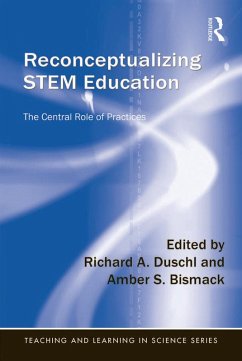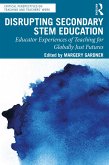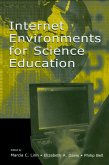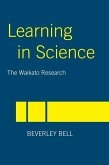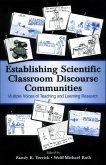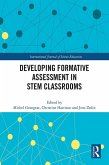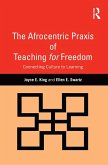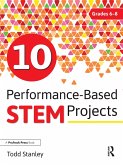Reconceptualizing STEM Education (eBook, PDF)
The Central Role of Practices
Redaktion: Duschl, Richard A.; Bismack, Amber S.
37,95 €
37,95 €
inkl. MwSt.
Sofort per Download lieferbar

19 °P sammeln
37,95 €
Als Download kaufen

37,95 €
inkl. MwSt.
Sofort per Download lieferbar

19 °P sammeln
Jetzt verschenken
Alle Infos zum eBook verschenken
37,95 €
inkl. MwSt.
Sofort per Download lieferbar
Alle Infos zum eBook verschenken

19 °P sammeln
Reconceptualizing STEM Education (eBook, PDF)
The Central Role of Practices
Redaktion: Duschl, Richard A.; Bismack, Amber S.
- Format: PDF
- Merkliste
- Auf die Merkliste
- Bewerten Bewerten
- Teilen
- Produkt teilen
- Produkterinnerung
- Produkterinnerung

Bitte loggen Sie sich zunächst in Ihr Kundenkonto ein oder registrieren Sie sich bei
bücher.de, um das eBook-Abo tolino select nutzen zu können.
Hier können Sie sich einloggen
Hier können Sie sich einloggen
Sie sind bereits eingeloggt. Klicken Sie auf 2. tolino select Abo, um fortzufahren.

Bitte loggen Sie sich zunächst in Ihr Kundenkonto ein oder registrieren Sie sich bei bücher.de, um das eBook-Abo tolino select nutzen zu können.
In this volume, STEM Education experts explore and map out research and development ideas and issues around five themes-Systems Thinking, Model-Based Reasoning, Quantitative Reasoning, Equity, Epistemic, and Ethical Outcomes, and STEM Communication and Outreach-aligned with the agenda set out by the Next Generation Science Standards and the National Research Council's "A Framework for K-12 Science Education."
- Geräte: PC
- mit Kopierschutz
- eBook Hilfe
- Größe: 3.04MB
Andere Kunden interessierten sich auch für
![Disrupting Secondary STEM Education (eBook, PDF) Disrupting Secondary STEM Education (eBook, PDF)]() Disrupting Secondary STEM Education (eBook, PDF)37,95 €
Disrupting Secondary STEM Education (eBook, PDF)37,95 €![Internet Environments for Science Education (eBook, PDF) Internet Environments for Science Education (eBook, PDF)]() Internet Environments for Science Education (eBook, PDF)73,95 €
Internet Environments for Science Education (eBook, PDF)73,95 €![Learning in Science (eBook, PDF) Learning in Science (eBook, PDF)]() Beverley BellLearning in Science (eBook, PDF)54,95 €
Beverley BellLearning in Science (eBook, PDF)54,95 €![Establishing Scientific Classroom Discourse Communities (eBook, PDF) Establishing Scientific Classroom Discourse Communities (eBook, PDF)]() Establishing Scientific Classroom Discourse Communities (eBook, PDF)54,95 €
Establishing Scientific Classroom Discourse Communities (eBook, PDF)54,95 €![Developing Formative Assessment in STEM Classrooms (eBook, PDF) Developing Formative Assessment in STEM Classrooms (eBook, PDF)]() Developing Formative Assessment in STEM Classrooms (eBook, PDF)52,95 €
Developing Formative Assessment in STEM Classrooms (eBook, PDF)52,95 €![The Afrocentric Praxis of Teaching for Freedom (eBook, PDF) The Afrocentric Praxis of Teaching for Freedom (eBook, PDF)]() Joyce E. KingThe Afrocentric Praxis of Teaching for Freedom (eBook, PDF)51,95 €
Joyce E. KingThe Afrocentric Praxis of Teaching for Freedom (eBook, PDF)51,95 €![10 Performance-Based STEM Projects for Grades 6-8 (eBook, PDF) 10 Performance-Based STEM Projects for Grades 6-8 (eBook, PDF)]() Todd Stanley10 Performance-Based STEM Projects for Grades 6-8 (eBook, PDF)26,95 €
Todd Stanley10 Performance-Based STEM Projects for Grades 6-8 (eBook, PDF)26,95 €-
-
-
In this volume, STEM Education experts explore and map out research and development ideas and issues around five themes-Systems Thinking, Model-Based Reasoning, Quantitative Reasoning, Equity, Epistemic, and Ethical Outcomes, and STEM Communication and Outreach-aligned with the agenda set out by the Next Generation Science Standards and the National Research Council's "A Framework for K-12 Science Education."
Dieser Download kann aus rechtlichen Gründen nur mit Rechnungsadresse in A, B, BG, CY, CZ, D, DK, EW, E, FIN, F, GR, HR, H, IRL, I, LT, L, LR, M, NL, PL, P, R, S, SLO, SK ausgeliefert werden.
Produktdetails
- Produktdetails
- Verlag: Taylor & Francis eBooks
- Seitenzahl: 364
- Erscheinungstermin: 8. Januar 2016
- Englisch
- ISBN-13: 9781317458517
- Artikelnr.: 44753438
- Verlag: Taylor & Francis eBooks
- Seitenzahl: 364
- Erscheinungstermin: 8. Januar 2016
- Englisch
- ISBN-13: 9781317458517
- Artikelnr.: 44753438
- Herstellerkennzeichnung Die Herstellerinformationen sind derzeit nicht verfügbar.
Richard A. Duschl is the Kenneth B. Waterbury Chaired Professor in Secondary Education, Department of Curriculum and Instruction, College of Education, The Pennsylvania State University, USA. Amber S. Bismack is a Ph.D. student, Department of Educational Studies (Science Education), School of Education, The University of Michigan, USA.
CONTENTS
1. Introduction: Coordinating PreK-16 STEM Education Research and
Practices for Advancing and Refining Reform Agendas
Richard A. Duschl, Amber S. Bismack, James Greeno and Drew H. Gitomer
Theme 1: Systems Thinking
2. Thinking about a System and Systems Thinking in Engineering
Thomas A. Litzinger
3. Diagnostic Instruction: Toward an Integrated System for Classroom
Assessment
Jim Minstrell, Ruth Anderson, and Min Li
4. Response 1: Systems Thinking as a Design Problem
Marcela Borge
5. Response 2: Improving Learning about Systems Requires Designing for
Change in Educational Systems
William R. Penuel
Theme 2: Model-Based Reasoning
6. Modeling Authentic STEM Research: A Systems Thinking Perspective
Annmarie R. Ward
7. Meeting the Standards for STEM Educations: Individual and National
Needs
Spencer A. Benson
8. Response 1: Model-Based Reasoning in Professional Development
Hilda Borko
9. Response 2: "Where is the line?"
Brian P. Coppola
Theme 3: Quantitative Reasoning
10. Quantitative Reasoning in Mathematics Education: Directions in
Research and Practice
Heather Lynn Johnson
11. Teachers Use of Data, Measurement, and Data Modeling in Quantitative
Reasoning
Anthony J. Petrosino
12. Response 1: Quantitative Reasoning in STEM Disciplines
Robert Mayes
13. Response 2: Quantitative Reasoning: Capturing a Tension Between
Structure and Variability
Rose Mary Zbiek
Theme 4: Equity, Epistemic, and Ethical Outcomes
14. Educational and Ethical Dilemmas for STEM Education in Pennsylvania's
Marcellus Shale Gasfield Communities
Catharine Biddle & Kai A. Schafft
15. Defining a Knowledge Base for Reasoning in Science: The role of
procedural and epistemic knowledge
Jonathan Osborne
16. Response 1: Views from Above and Below: Access to Science Education
Nancy Brickhouse
17. Response 2: The Values of Science Literacy
Nancy Tuana
Theme 5: STEM Communication and Policy Outreach
18. Why People Care About Chickens and Other Lessons about Rhetoric,
Public Science, and Informal Learning Environments
Stacey Pigg, William Hart-Davidson, Jeff Grabill, and Kirsten
Ellenbogen
19. New Environments for Professional Development: Situating Science
Learning and Teaching in a Framework and NGSS World
Jean Moon
20. Response 1: School-System Contexts for Professional Development
Edward J. Fuller
21. Response 2: Technology-supported Communication in Science:
Conjectures on Expertise and Evaluation
Drew H. Gitomer
Reflections and Summary
22. Reflections on the Waterbury Summit: STEAM And Systems Thinking
Stephanie E. Vasko
23. Summary: Driving Change Forward
Amber S. Bismack, Yann Shiou Ong, Armend Tahirsylaj, and Richard A. Duschl
About the Authors
Waterbury Summit Participants
1. Introduction: Coordinating PreK-16 STEM Education Research and
Practices for Advancing and Refining Reform Agendas
Richard A. Duschl, Amber S. Bismack, James Greeno and Drew H. Gitomer
Theme 1: Systems Thinking
2. Thinking about a System and Systems Thinking in Engineering
Thomas A. Litzinger
3. Diagnostic Instruction: Toward an Integrated System for Classroom
Assessment
Jim Minstrell, Ruth Anderson, and Min Li
4. Response 1: Systems Thinking as a Design Problem
Marcela Borge
5. Response 2: Improving Learning about Systems Requires Designing for
Change in Educational Systems
William R. Penuel
Theme 2: Model-Based Reasoning
6. Modeling Authentic STEM Research: A Systems Thinking Perspective
Annmarie R. Ward
7. Meeting the Standards for STEM Educations: Individual and National
Needs
Spencer A. Benson
8. Response 1: Model-Based Reasoning in Professional Development
Hilda Borko
9. Response 2: "Where is the line?"
Brian P. Coppola
Theme 3: Quantitative Reasoning
10. Quantitative Reasoning in Mathematics Education: Directions in
Research and Practice
Heather Lynn Johnson
11. Teachers Use of Data, Measurement, and Data Modeling in Quantitative
Reasoning
Anthony J. Petrosino
12. Response 1: Quantitative Reasoning in STEM Disciplines
Robert Mayes
13. Response 2: Quantitative Reasoning: Capturing a Tension Between
Structure and Variability
Rose Mary Zbiek
Theme 4: Equity, Epistemic, and Ethical Outcomes
14. Educational and Ethical Dilemmas for STEM Education in Pennsylvania's
Marcellus Shale Gasfield Communities
Catharine Biddle & Kai A. Schafft
15. Defining a Knowledge Base for Reasoning in Science: The role of
procedural and epistemic knowledge
Jonathan Osborne
16. Response 1: Views from Above and Below: Access to Science Education
Nancy Brickhouse
17. Response 2: The Values of Science Literacy
Nancy Tuana
Theme 5: STEM Communication and Policy Outreach
18. Why People Care About Chickens and Other Lessons about Rhetoric,
Public Science, and Informal Learning Environments
Stacey Pigg, William Hart-Davidson, Jeff Grabill, and Kirsten
Ellenbogen
19. New Environments for Professional Development: Situating Science
Learning and Teaching in a Framework and NGSS World
Jean Moon
20. Response 1: School-System Contexts for Professional Development
Edward J. Fuller
21. Response 2: Technology-supported Communication in Science:
Conjectures on Expertise and Evaluation
Drew H. Gitomer
Reflections and Summary
22. Reflections on the Waterbury Summit: STEAM And Systems Thinking
Stephanie E. Vasko
23. Summary: Driving Change Forward
Amber S. Bismack, Yann Shiou Ong, Armend Tahirsylaj, and Richard A. Duschl
About the Authors
Waterbury Summit Participants
CONTENTS
1. Introduction: Coordinating PreK-16 STEM Education Research and
Practices for Advancing and Refining Reform Agendas
Richard A. Duschl, Amber S. Bismack, James Greeno and Drew H. Gitomer
Theme 1: Systems Thinking
2. Thinking about a System and Systems Thinking in Engineering
Thomas A. Litzinger
3. Diagnostic Instruction: Toward an Integrated System for Classroom
Assessment
Jim Minstrell, Ruth Anderson, and Min Li
4. Response 1: Systems Thinking as a Design Problem
Marcela Borge
5. Response 2: Improving Learning about Systems Requires Designing for
Change in Educational Systems
William R. Penuel
Theme 2: Model-Based Reasoning
6. Modeling Authentic STEM Research: A Systems Thinking Perspective
Annmarie R. Ward
7. Meeting the Standards for STEM Educations: Individual and National
Needs
Spencer A. Benson
8. Response 1: Model-Based Reasoning in Professional Development
Hilda Borko
9. Response 2: "Where is the line?"
Brian P. Coppola
Theme 3: Quantitative Reasoning
10. Quantitative Reasoning in Mathematics Education: Directions in
Research and Practice
Heather Lynn Johnson
11. Teachers Use of Data, Measurement, and Data Modeling in Quantitative
Reasoning
Anthony J. Petrosino
12. Response 1: Quantitative Reasoning in STEM Disciplines
Robert Mayes
13. Response 2: Quantitative Reasoning: Capturing a Tension Between
Structure and Variability
Rose Mary Zbiek
Theme 4: Equity, Epistemic, and Ethical Outcomes
14. Educational and Ethical Dilemmas for STEM Education in Pennsylvania's
Marcellus Shale Gasfield Communities
Catharine Biddle & Kai A. Schafft
15. Defining a Knowledge Base for Reasoning in Science: The role of
procedural and epistemic knowledge
Jonathan Osborne
16. Response 1: Views from Above and Below: Access to Science Education
Nancy Brickhouse
17. Response 2: The Values of Science Literacy
Nancy Tuana
Theme 5: STEM Communication and Policy Outreach
18. Why People Care About Chickens and Other Lessons about Rhetoric,
Public Science, and Informal Learning Environments
Stacey Pigg, William Hart-Davidson, Jeff Grabill, and Kirsten
Ellenbogen
19. New Environments for Professional Development: Situating Science
Learning and Teaching in a Framework and NGSS World
Jean Moon
20. Response 1: School-System Contexts for Professional Development
Edward J. Fuller
21. Response 2: Technology-supported Communication in Science:
Conjectures on Expertise and Evaluation
Drew H. Gitomer
Reflections and Summary
22. Reflections on the Waterbury Summit: STEAM And Systems Thinking
Stephanie E. Vasko
23. Summary: Driving Change Forward
Amber S. Bismack, Yann Shiou Ong, Armend Tahirsylaj, and Richard A. Duschl
About the Authors
Waterbury Summit Participants
1. Introduction: Coordinating PreK-16 STEM Education Research and
Practices for Advancing and Refining Reform Agendas
Richard A. Duschl, Amber S. Bismack, James Greeno and Drew H. Gitomer
Theme 1: Systems Thinking
2. Thinking about a System and Systems Thinking in Engineering
Thomas A. Litzinger
3. Diagnostic Instruction: Toward an Integrated System for Classroom
Assessment
Jim Minstrell, Ruth Anderson, and Min Li
4. Response 1: Systems Thinking as a Design Problem
Marcela Borge
5. Response 2: Improving Learning about Systems Requires Designing for
Change in Educational Systems
William R. Penuel
Theme 2: Model-Based Reasoning
6. Modeling Authentic STEM Research: A Systems Thinking Perspective
Annmarie R. Ward
7. Meeting the Standards for STEM Educations: Individual and National
Needs
Spencer A. Benson
8. Response 1: Model-Based Reasoning in Professional Development
Hilda Borko
9. Response 2: "Where is the line?"
Brian P. Coppola
Theme 3: Quantitative Reasoning
10. Quantitative Reasoning in Mathematics Education: Directions in
Research and Practice
Heather Lynn Johnson
11. Teachers Use of Data, Measurement, and Data Modeling in Quantitative
Reasoning
Anthony J. Petrosino
12. Response 1: Quantitative Reasoning in STEM Disciplines
Robert Mayes
13. Response 2: Quantitative Reasoning: Capturing a Tension Between
Structure and Variability
Rose Mary Zbiek
Theme 4: Equity, Epistemic, and Ethical Outcomes
14. Educational and Ethical Dilemmas for STEM Education in Pennsylvania's
Marcellus Shale Gasfield Communities
Catharine Biddle & Kai A. Schafft
15. Defining a Knowledge Base for Reasoning in Science: The role of
procedural and epistemic knowledge
Jonathan Osborne
16. Response 1: Views from Above and Below: Access to Science Education
Nancy Brickhouse
17. Response 2: The Values of Science Literacy
Nancy Tuana
Theme 5: STEM Communication and Policy Outreach
18. Why People Care About Chickens and Other Lessons about Rhetoric,
Public Science, and Informal Learning Environments
Stacey Pigg, William Hart-Davidson, Jeff Grabill, and Kirsten
Ellenbogen
19. New Environments for Professional Development: Situating Science
Learning and Teaching in a Framework and NGSS World
Jean Moon
20. Response 1: School-System Contexts for Professional Development
Edward J. Fuller
21. Response 2: Technology-supported Communication in Science:
Conjectures on Expertise and Evaluation
Drew H. Gitomer
Reflections and Summary
22. Reflections on the Waterbury Summit: STEAM And Systems Thinking
Stephanie E. Vasko
23. Summary: Driving Change Forward
Amber S. Bismack, Yann Shiou Ong, Armend Tahirsylaj, and Richard A. Duschl
About the Authors
Waterbury Summit Participants
